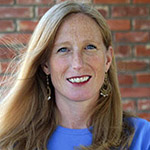Linda Babcock, PhD, co-author of Women Don’t Ask: Negotiations and the Gender Divide, will discuss that topic during a lecture at 9 a.m. Friday, April 12, in Simon Hall, Room 106.

The lecture is part of the “Distinguished Women in Economics and Strategy” series sponsored by WUSTL’s Center for Research in Economics and Strategy, housed in Olin Business School.
The event is open to the university community, but space is limited and reservations are required. To confirm attendance for the talk and a continental breakfast beginning at 8:30 a.m., contact Sandy Vaughn at svaughn@wustl.edu or (314) 935-6707.
Babcock also will give a lecture to faculty and doctoral students Thursday, April 11, titled “What Do We Know About Gender and Negotiation? New Evidence on How and When Women Do Ask” and join a panel discussion with William P. Bottom, PhD, the Joyce and Howard Wood Distinguished Professor of Organizational Behavior; Hillary Anger Elfenbein, PhD, professor of organizational behavior; and Judi McLean Parks, PhD, the Reuben C. and Anne Carpenter Taylor Professor of Organizational Behavior.
Babcock is the James M. Walton Professor of Economics at Carnegie Mellon University and former acting dean of Carnegie’s Heinz School of Public Policy and Management. Her 2003 book on gender and negotiations, co-authored with Sara Laschever, was named by Fortune magazine as one of the 75 smartest business books of all time; it has since been translated into Spanish, Italian, Chinese, Korean, Japanese and Danish.
“One of the challenges confronting junior female faculty in business schools, as well as in other parts of academe, is the small number of senior female faculty who might serve as mentors or role models or co-authors,” says Glenn MacDonald, PhD, the John M. Olin Distinguished Professor of Economics and Strategy.
“Female students face similar situations in industries such as investment banking or consulting,” he says. “The Distinguished Women in Economics and Strategy series takes a step in the direction of improvement by bringing some of the most accomplished women in economics or strategy to WUSTL, and making them available to faculty, students and the university community in general. We have had good fortune in attracting scholars who have shown skill and willingness to help our female faculty and students in their professional development.”
Babcock is the founder and faculty director of the Program for Research and Outreach on Gender Equity in Society and is a member of the Russell Sage Foundation’s Behavioral Economics Roundtable. She holds several degrees in economics, including a doctorate from the University of Wisconsin at Madison, and has been a visiting professor at the University of Chicago’s Graduate School of Business, the Harvard Business School and the California Institute of Technology. She has received numerous research grants from – and served on the economics review panel for – the National Science Foundation.
Babcock’s research explores gender issues at the interface between economics and psychology, including current work on gender differences in the propensity to initiate negotiations and on how people react to women when they do negotiate. Her research on women and negotiations appears in top journals across a range of disciplines, including economics, psychology, industrial relations and law. Her work has been discussed in hundreds of newspapers and magazines in the U.S. and abroad and she’s often called upon to discuss her work on radio and television.